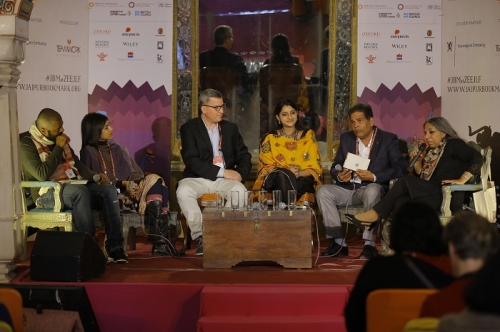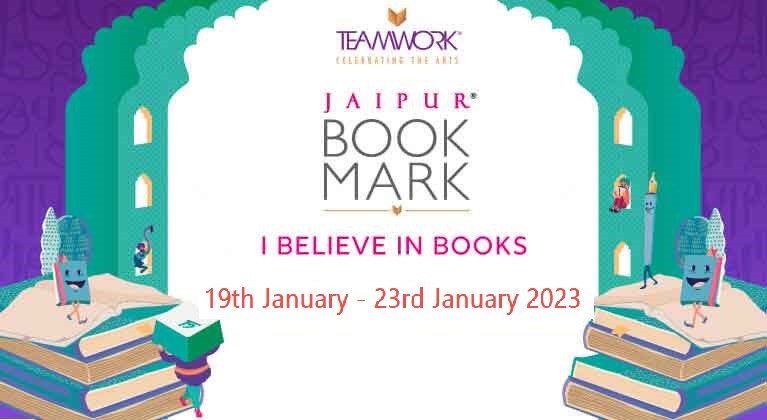
For The Love Of Books
Akshay Rautaray, Nikko Odiseos, Satabdi Mishra, Shruti Sharma and Tilak Sharma in conversation with Urvashi Butalia
By Medhavi Dhyani, Official ZEE Jaipur Literature Festival 2018 Blogger
The opening panel discussion at Jaipur Bookmark saw a number of passionate individuals brought together by a common driving force: the zeal to make sources of knowledge more accessible. Feminist and historian Urvashi Butalia called the session “a fitting way to start the festival,” given its long-term commitment to democratising access to literature.
American writer-publisher Nikko Odiseos said the session symbolised what was at the heart of the entire festival: “a love for books”. His own passion for books is evident in Shambhala Publications, an independent publishing house specialising in Buddhism, which prioritises subject matter over profit, and focuses on niche audiences rather than trying to satisfy a mainstream agenda, such as the recently published book of Sanskrit poetry, written by an ancient Indian mystic.
For booksellers Akshay Rautaray and Satabadi Mishra, the discovery of books came relatively late, since their Oriya hometown didn’t have a single library or bookstore when they were growing up. Their shared belief in the ability of books to transform worldviews, led them to initiate ‘Walking Book Fairs’ in 2014. They displayed books on the pavements of their hometown, creating a whole new world for the residents. Many residents had never seen books other than school textbooks.
The residents’ enthusiastic reception inspired them to drive across rural Orissa with their ‘Travelling Library’, which, for Rautaray, acts as a monumental advertisement of self-education for people who don’t usually have access to books. Their ‘Book Truck’ sells books at discounted prices and also doubles up as a library.
Striking a resonant chord with the audience, writer Shruti Sharma talked about her initiative of leaving books on the Delhi metro trains once she has finished reading them, inspired by daily metro commutes in Delhi and the ‘Books on the Move’ movement in London. Sharma’s motive was to stir Delhiites to rediscover their love of reading, which she had witnessed increasingly dissipating. She observed that the movement had forged a tangible community of like-minded people from distinctive socio-economic backgrounds, whom she calls “book fairies”, and thus brought an alienated world closer, as more and more readers leave books for other kindred spirits to discover.
Curator Tilak Sharma spoke movingly about a book written by his father, which never saw the light of publication, due to an acute lack of finances. He explained that this had motivated his father to discover and collect other unpublished manuscripts. Artfully curated over six decades, these manuscripts are now all displayed in Jaipur’s Shree Sanjay Sharma Museum. The collection – the largest of its kind in Asia – presents manuscripts in 16 Indian and 5 foreign languages, written on mediums ranging from palm leaves to bamboo papers, on wide-ranging subjects by numerous unrecognised authors. Sharma carries forward his father’s legacy by bringing into public view, precious works lost in time and rejected by a vicious market. The collection forms, according to him, a “microcosm of an entire civilisation.”
All the panellists stand testament to the fact that there still exist avenues of publication and circulation of books that remain largely unperturbed by the overpowering capitalistic drive of larger publishers. These people, who work tirelessly to make access to reading materials and education more democratic and equitable, prove that love and knowledge only multiply when shared.






